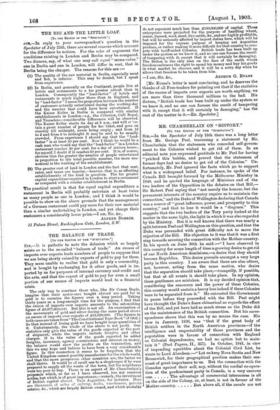THE BIG AND THE LITTLE LOAF.
[To THE EDITOR OP THE "SPECTATOR:1
0114—In reply to your correspondent's question in the Spectator of July 25th, there are several reasons which account for the difference he notices. For the sake of argument the conditions existing in London and Berlin may be compared. Two dinners, say, of what one may call equal "menu-value," one in Berlin and one in London, will differ in cost, that in
Berlin being the cheaper. The reasons for this are :-
(1) The quality of the raw material in Berlin, especially meat and fish, is inferior. This may be denied, but I speak from experience.
(2) In Berlin, and generally on the Continent, people live at hotels and restaurants to a far greater extent than in London. Consequently the " load-factor " of hotels and restaurants is much higher there than in England, and by" load-factor" I mean the proportion between the number of customers actually entertained during the working-day and the number that could have been entertained. If the Kaiser Keller in Berlin is compared with similar establishments in London—e.g. the Criterion, Cafe Royal, and Trocadero—considerable differences will be observed. The Kaiser Keller starts its day at 8 a.m., and will er ter- tain a great number of people for bre- kfast, and goes on steadily till midnight, never being empty ; and from 12 to 3 and from 6 to midnight it may be said to be usually crowded. From experience I should say that the " load- factor " is at least 50 per cent. Now I think he would be a rash man who would say that the " load-factor " in a London restaurant reaches 30 per cent, for a day of sixteen hours ; for myself, I doubt if it reaches 10 per cent. It is, of course, obvious that the greater the number of people entertained in proportion to this total possible number, the more eco- nomical is the working of the establishment.
The greater cost of land in London and the fact that rent, rates, and taxes are heavier,—heavier, that is, as affecting establishments of the kind in question. The far greater capital expenditure required in London to start a restaurant as compared with a similar establishment in Berlin.
The practical result is that for equal capital expenditure a restaurant in Berlin will probably entertain at least twice as many people as one in London; and I think it would be possible to show on the above grounds that the management of a German restaurant could pay more for their raw material than a similar undertaking in London, and yet charge their customers a considerably lower price.—I am, Sir, &c.,
ALFRED DOBREE. ALFRED DOBREE.
11 Palace Street, Buckingham Gate, London, S.W.






































 Previous page
Previous page